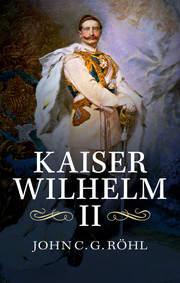Book contents
- Frontmatter
- Dedication
- Contents
- List of figures
- Acknowledgements
- Preface to the English edition
- Preface to the German edition
- Acknowledgements
- Overview: Wilhelm the Last, a German trauma
- Part I 1859–1888: The Tormented Prussian Prince
- Part II 1888–1909: The Anachronistic Autocrat
- Part III 1896–1908: The Egregious Expansionist
- 10 The challenge to Europe: Weltmachtpolitik and the battlefleet
- 11 The Russo-Japanese War and the meeting of the emperors on Björkö (1904–1905)
- 12 War in the west? The landing in Tangier and the fiasco of Algeciras (1905–1906)
- 13 The intensification of the Anglo-German conflict
- Part IV 1906–1909: The Scandal-Ridden Sovereign
- Part V 1908–1914: The Bellicose Supreme War Lord
- Part VI 1914–1918: The Champion of God’s Germanic Cause
- Part VII 1918–1941: The Vengeful Exile
- Notes
- Index
10 - The challenge to Europe: Weltmachtpolitik and the battlefleet
Published online by Cambridge University Press: 05 September 2014
- Frontmatter
- Dedication
- Contents
- List of figures
- Acknowledgements
- Preface to the English edition
- Preface to the German edition
- Acknowledgements
- Overview: Wilhelm the Last, a German trauma
- Part I 1859–1888: The Tormented Prussian Prince
- Part II 1888–1909: The Anachronistic Autocrat
- Part III 1896–1908: The Egregious Expansionist
- 10 The challenge to Europe: Weltmachtpolitik and the battlefleet
- 11 The Russo-Japanese War and the meeting of the emperors on Björkö (1904–1905)
- 12 War in the west? The landing in Tangier and the fiasco of Algeciras (1905–1906)
- 13 The intensification of the Anglo-German conflict
- Part IV 1906–1909: The Scandal-Ridden Sovereign
- Part V 1908–1914: The Bellicose Supreme War Lord
- Part VI 1914–1918: The Champion of God’s Germanic Cause
- Part VII 1918–1941: The Vengeful Exile
- Notes
- Index
Summary
Very soon after the establishment of the German Reich Bismarck had been compelled to acknowledge that with his three wars of unification, against Denmark in 1864, Austria in 1866 and France in 1870–1, the empire had reached the boundaries of what the European states system could tolerate. He had therefore set his face against demands for a further war against Austria or France and entered the race for overseas colonies with great reluctance. Instead, he encouraged the other European great powers (Great Britain, France, Austria-Hungary and Russia) to indulge in imperial expansion, thereby succeeding to a certain extent in diverting their rivalries away from Germany and out to the periphery, where they found themselves in conflict with each other. Such self-imposed restraint was utterly foreign to the young, hot-headed Wilhelm II, eager for action and craving recognition. His veneration for his dynastic forebears – above all the Great Elector, the ‘Sergeant King’, Frederick the Great and his own grandfather Kaiser Wilhelm I – expressed itself not only in his determination to reassert the rights of the Crown after Bismarck’s long quasi-dictatorship as Chancellor; his identification with the warlike Hohenzollern heroes of yore also convinced him that he had a duty to lead Prussia/Germany to new greatness. On 22 March 1897, the centenary of his grandfather’s birth, he made a speech asserting that Prince von Bismarck and Field Marshal Count Helmuth von Moltke had been nothing but ‘lackeys and pygmies’ of his grandfather; it was not they but ‘Kaiser Wilhelm the Great’ who had enlarged Prussia and made it the centre of the German Reich – and in the same way he aimed to make the German Reich the centre of a united European continent.
- Type
- Chapter
- Information
- Kaiser Wilhelm IIA Concise Life, pp. 73 - 82Publisher: Cambridge University PressPrint publication year: 2014



